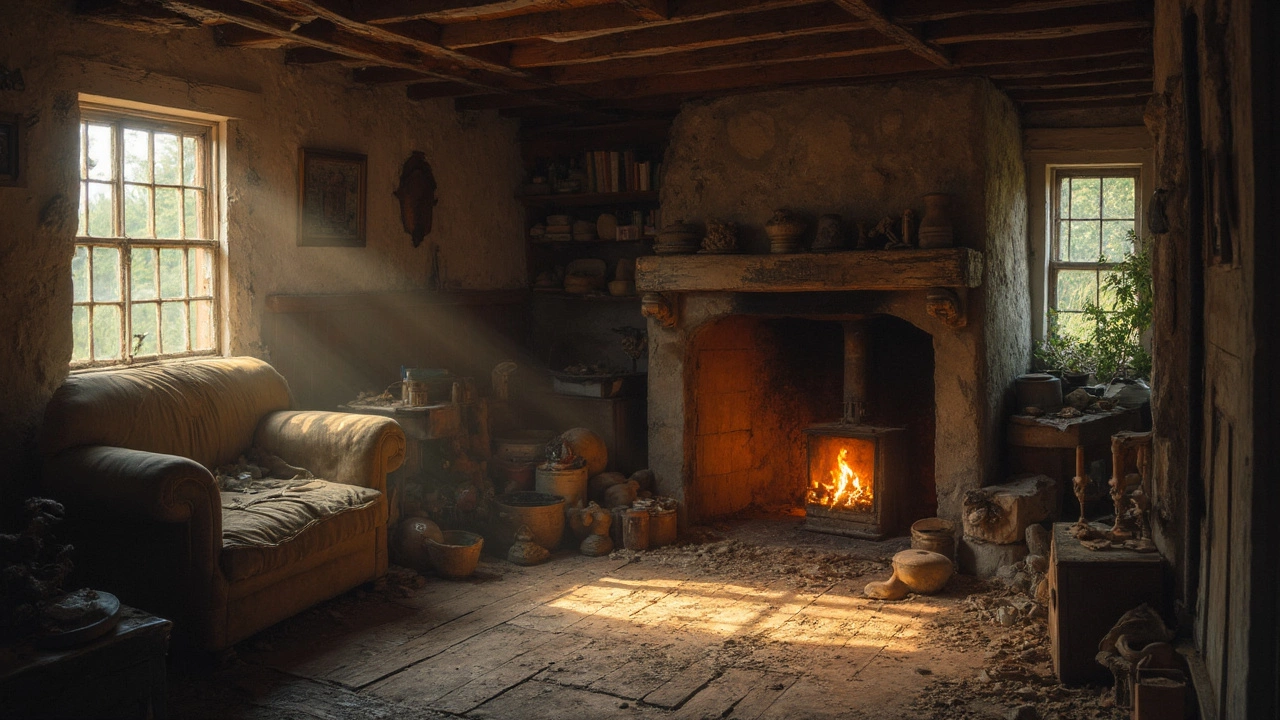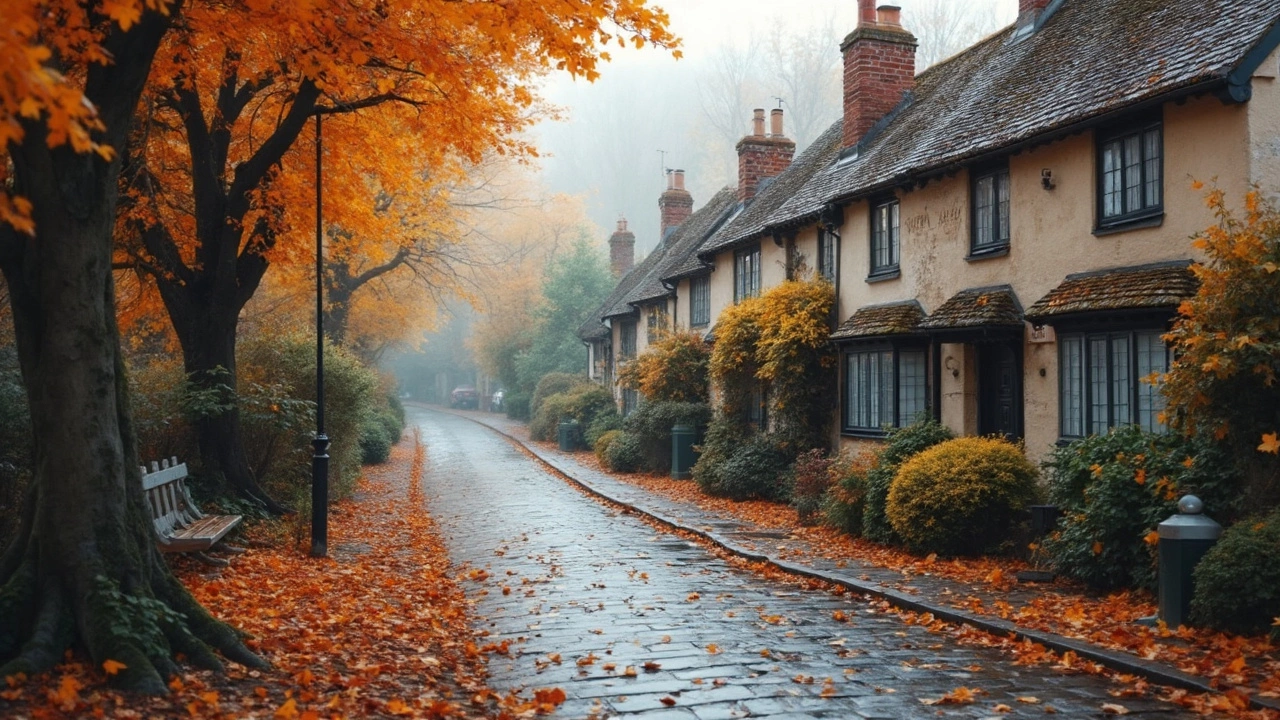Thinking about swapping city life for a cute cottage in the countryside? It sounds like a dream come true, right? Peaceful mornings, chirping birds, and maybe even a crackling fireplace. But hang on a second—there's more than what meets the eye.
One of the first things you'll notice about cottage living is the cozy space, which can be both a blessing and a curse. Sure, less room means less to clean, but it also means you might find yourself tripping over things every now and then. And those charming thin walls? They might let in more noise than you'd want, especially if there's a lively game night next door.
Maintaining an older cottage home can be quite the task. Those beautiful wooden floors? They often need regular upkeep. And let's not forget that leaky roof when it pours. It's not all sunshine and rainbows in rural living; sometimes it’s a bit of elbow grease too.
When it comes to getting around, cottages aren't always in the most accessible locations. A quick trip to the store or even to see friends might take a bit longer than you're used to. And if you don't like driving in the dark on winding roads, it might make your evening plans a bit daunting.
- Limited Space and Privacy
- Maintenance Troubles
- Accessibility Issues
- Weather Challenges
- High Costs and Utility Concerns
Limited Space and Privacy
Ever tried hosting a dinner party in a cottage home? It's like solving a puzzle just to fit everyone and everything. While the intimate setting might seem cozy, the reality of limited space often hits hard, especially when you start accumulating stuff. Storage becomes a critical issue, as those charming nooks can't always hide the clutter.
Regarding privacy, those timber walls aren't very forgiving. You might hear your neighbor's TV, pets, or even their late-night chats. This can throw a wrench in your plans for some peace and quiet.
For larger families, fewer rooms can mean sharing your space more than you’d like. Sometimes, just finding a quiet spot to read a book can be a challenge. And let’s face it, privacy becomes a precious commodity when everyone can hear the bathroom from the living room.
If you work from home, setting up a separate office space can feel like playing an advanced game of Tetris. These homes often aren’t designed with the modern needs of remote work, meaning you might find yourself working from the kitchen table more often than you'd like.
To wrap it up, country cottages come with their fair share of compromises in terms of space and privacy. They might not be suited for everyone, especially if you crave personal space or need peace and quiet to work. But remember, these are the unique quirks that add to their charm, providing a lifestyle contrasting with the hustle of urban environments.
Maintenance Troubles
Owning a cottage home can feel like a dream, but when it comes down to maintenance, things can get a bit tricky. These homes often have a vintage charm, and with that usually comes aging structures and materials.
First off, those beautiful wooden fixtures and floors you love? They don't stay polished and pristine on their own. Wood is notorious for expanding and contracting with the weather, leading to creaks or even gaps. Regular treatments and varnishing are necessary to keep it looking good and lasting longer.
Then there’s the matter of the roof. Cottages often boast traditional thatched or slate roofs, which are lovely to look at but can leak like nobody's business if not properly cared for. It’s not uncommon to need repairs or even replacements every few years.
The National Association of Home Builders notes, "Older homes, especially those in rural areas, often require more frequent maintenance due to the materials and designs typical of their era."
Rural living also means you're more exposed to the elements. Gutters need consistent clearing to avoid pesky water damage or ice dam formation in the chillier months.
Let’s not forget about those quaint fireplaces. They don’t just stoke themselves! Regular sweeping and chimney maintenance are tasks you’ll need to tackle if you want to enjoy a crackling fire safely.
- Schedule regular check-ups for the roof and flooring.
- Keep gutters clear to prevent blockages.
- Ensure fireplaces and chimneys are cleaned and properly vented.
In short, living in a cottage home isn't just about sipping tea by the window. It's about rolling up your sleeves and getting into some good old-fashioned home care!

Accessibility Issues
You ever find yourself dreaming of a cottage home tucked away in the countryside, only to stop and wonder how you'd actually get there? Accessibility is one of those things you don't really think about until it's too late. Cottages, especially those in rural areas, can be a bit off the beaten path.
One of the main concerns is the distance from essential services. Living in a country cottage might mean that the nearest grocery store, hospital, or school could be miles away. This could mean planning trips more meticulously or stocking up on essentials to minimize journeys.
Additionally, public transportation options might be scarce or non-existent. If you're used to hopping on a bus or train in the city, you might find yourself needing a car—or maybe even an off-road vehicle—to navigate those winding, sometimes bumpy roads.
In terms of infrastructure, rural areas don't always have the best roads. A morning frost or rainy season can turn a pleasant drive into a muddy adventure. If you struggle with driving in such conditions, this could be a real deal-breaker.
Even accessibility within the cottage itself can be tricky. Older cottages may not be designed with modern accessibility needs in mind, like wide doorways or ramps. If mobility is a concern for you or someone you're living with, make sure to evaluate the structural layout of the home before committing.
While these challenges can be navigated, it's important to weigh them against the charm and tranquility that a rural living space promises. So make sure to do your homework before taking the plunge into cottage life!
Weather Challenges
Living in a cottage home means you get as close to nature as possible. But Mother Nature isn't always kind. If you think city weather is annoying, wait until you're living amidst the trees and open fields. The rustic charm can quickly turn into a struggle, especially when the weather decides to get fierce.
First up, brace yourself for wintery chills. Many older cottage homes might lack proper insulation, and you could find yourself bundling up indoors as if you’re outside. Drafty windows and doors are pretty common, meaning your heating bill might sneak up on you big time.
Then there's the rain. You might have thought those wooden beams looked lovely, but constant rain can be a real bummer for them. Moisture has this way of sneaking into cracks and corners, sometimes leading to mold or rot if not handled quickly. A few episodes of heavy rain, and it's like you're living in a constant DIY project.
And when it comes to summer, don't expect an instant paradise either. Cottages aren’t always prepared for the scorching heat. Air conditioning systems are often outdated or nonexistent, leaving you to rely on fans or other methods to keep cool. Plus, if you're in a rural area, say hello to more bugs and critters than you’re used to.
Considering these challenges, it's no wonder that many cottage dwellers become amateur weather forecasters, learning to read the sky and being prepared for just about anything nature throws their way. Having a small weather station or smart weather app can be your best friend, keeping you in the loop about sudden changes.

High Costs and Utility Concerns
Thinking of owning a cottage home? Let's talk cash flow because it isn't all quaint and cozy when it comes to your wallet. Buying a cottage might seem cheaper than city digs at first, but hidden expenses can sneak up on you faster than a squirrel raiding a bird feeder.
For starters, older cottages often need a bit of love, and that love often comes with a price tag. Repairs and renovations won't just eat up your weekends—they'll also gobble up cash. Plus, the material costs can be higher because, let's face it, vintage timber isn't as cheap as it used to be!
Let's chat about utilities. It's easy to assume rural life means lower bills, but that's not always true. Heating costs in the winter can skyrocket, especially in a drafty country cottage. And those charming wood-burning stoves? Great for ambiance, but not for your heating bill unless you're chopping your own wood.
Then there's water and electricity. Some cottage areas have limited supply options, meaning higher prices and sometimes less reliable services. Imagine dealing with a power cut mid-winter because there’s a storm—and many rural areas do face this issue.
In some places, you might need a well for water, and while that sounds rustic, wells require maintenance, and sometimes costly treatment if the water quality isn’t up to par. And let's not even get started on septic systems.
So, while a country cottage might seem like a cheaper escape, those hidden costs can add up, making budgeting and a bit of DIY knowledge crucial for keeping those idyllic dreams intact. It's always a good idea to chat with locals or a real estate expert familiar with the area for a realistic picture of the financial landscape.